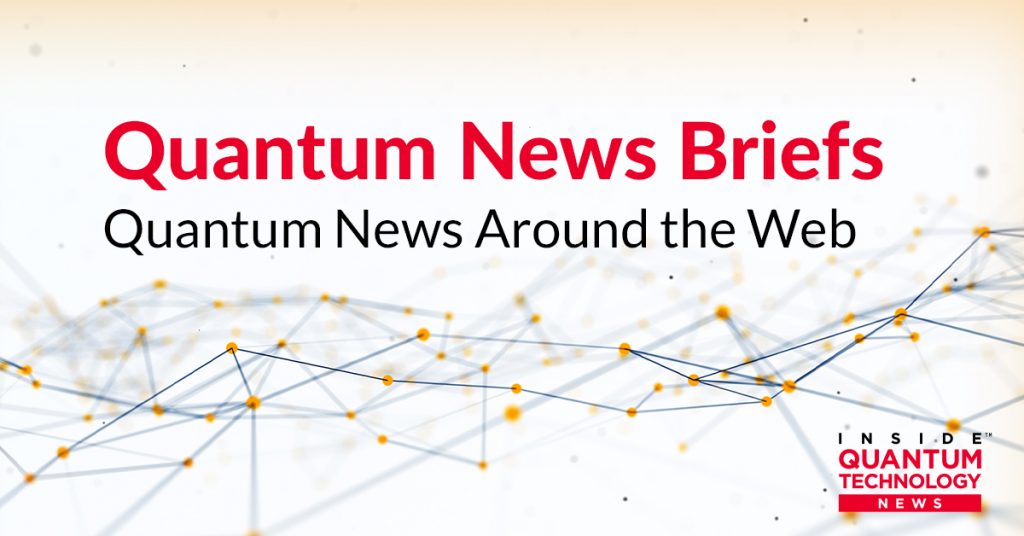Quantum News Briefs November 3 opens today with news that Universal Quantum has been awarded a $66M contract from DLR to build a fully scalable trapped-ion quantum computer followed by news of PQShield and Riscure collaborating on post-Quantum cryptography SCA validation; third is QuiX Quantum opens new Amsterdam office & MORE.
****
Universal Quantum wins $66M contract from DLR to build a fully scalable trapped-ion quantum computer
The DLR is bringing two world-first innovations to Hamburg: The first one will be a single-chip quantum computer with a sophisticated electronic quantum computer chip. The second one will be a multi-chip quantum computer that will initially consist of up to 100 qubits.
The basis for both machines will be the most powerful chip ever developed for a quantum computer. The quantum computers will be built within four years at the DLR facilities in Hamburg and will be made accessible to partners.
Trapped ion technology is one of the most mature approaches to building quantum computers. Experts believe that millions of qubits will be required to solve some of the most complex problems that benefit society. To achieve this, there are a few challenges: the reliable connection of chips – also called modules as well as cooling temperatures and other engineering requirements. Universal Quantum’s unique approach solves both of these issues and more, allowing modules to be connected like a jigsaw puzzle to scale to high qubit numbers, all while requiring only moderate cooling temperatures.
Click here to read complete announcement.
*****
PQShield and Riscure collaborate on post-Quantum cryptography SCA validation
PQShield is a market leader in quantum-ready cryptographic solutions for hardware, software and communications. The company is a major contributor to the NIST post-quantum standardisation project, and the draft standards it announced in July this year are all schemes contributed to by PQShield’s researchers and advisory board.
Riscure provides evaluation and validation services to reinforce the security of products and components including hardware cryptographic engines, large SoCs, boot ROM, security-enhanced software applications and trusted execution environments. Riscure also provides Security Tools and Training to help companies improve the security knowledge and expertise of their development teams.
With this project, the two companies will evaluate PQShield’s SCA testing process. They will also share knowledge about post-quantum cryptography and its impact on side channel attacks, advancing companies’ and governments’ understanding of how new quantum-secure algorithms can be secured through robust validation and countermeasures.
Marc Witteman CEO & Founder from Riscure added: “We have seen a surge in interest from businesses and governments recently looking to secure sensitive data with PQC. We are looking forward to working alongside PQShield, experts in PQC software and hardware co-design, by educating and sharing best practices with industry. With this collaboration we also aim to provide the industry with robust quantum-resistant Side Channel Analysis and lead to integration of PQC into our leading tools – in turn helping all major businesses and governments mitigate the quantum-threat.”
Click here to read complete announcement.
*****
QuiX Quantum opens new Amsterdam office
QuiX Quantum purposefully located its new office in Amsterdam.”This new location will undoubtedly allow for strategic relationships to blossom within the quantum ecosystem with closer proximity to excellences in the quantum information science and community such as QuSoft, The University of Amsterdam, the Centrum Wiskunde & Informatica and Quantum.Amsterdam.
“We are happy to see the Amsterdam quantum ecosystem growing with another Dutch company: we are welcoming QuiX Quantum to their new offices at the Startup Village of Science Park Amsterdam”, says Dr. Victor Land, Institute Coordinator Research Center for Quantum Software QuSoft for Quantum.Amsterdam. Quantum.Amsterdam is founded by QuSoft, Centrum Wiskunde & Informatica (CWI), and Universiteit van Amsterdam (UvA).
QuiXwas founded in January 2019 in Enschede, the Netherlands. Since then, they have successfully commercialized market leading technology and recently raised and secured a funding worth €5.5million. Now, QuiX Quantum will be the first European company to further develop a Universal Quantum Computer based on photonics as a customer-specific development.
*****
Trinity physicist to lead €2.9m quantum technologies flagship project
The grant will fund the Aspects consortium, which brings together leading experimental and theoretical physicists across Europe with the common goal of uncovering the energetic resources needed for precision measurement. One area where quantum technologies have a clear advantage is in precision measurement. For example, satellite navigation systems rely on very precise timestamps provided by atomic clocks orbiting the Earth. Such precise measurements cost energy, but could they be more energy-efficient?
“We are currently at the forefront of a new technological revolution, where the strange behaviour of tiny quantum particles such as atoms is being exploited to build the next generation of super-fast computers, secure communication devices, and ultra-precise sensors,” said Prof Mitchison, the coordinator of Aspects. “Quantum technology promises to become a huge industry over the next few decades, and the Quantum Technologies Flagship was designed to kickstart that activity in Europe.”
“As we gain increasingly precise control of quantum devices, we can finally reveal the limitations that nature imposes to one of the most interesting types of machines, clocks,” said Prof Natalia Ares, principal investigator at Oxford University. “By making use of semiconductor devices that allow for the control of single electrons and that are able oscillate as a quartz clock, we will be able to put to the test the most fundamental limits of timekeeping. Our findings might help inform the design of complex quantum circuits as we better understand the thermodynamics of quantum machines.”
Click here to read original article.
*****
Sandra K. Helsel, Ph.D. has been researching and reporting on frontier technologies since 1990. She has her Ph.D. from the University of Arizona.
